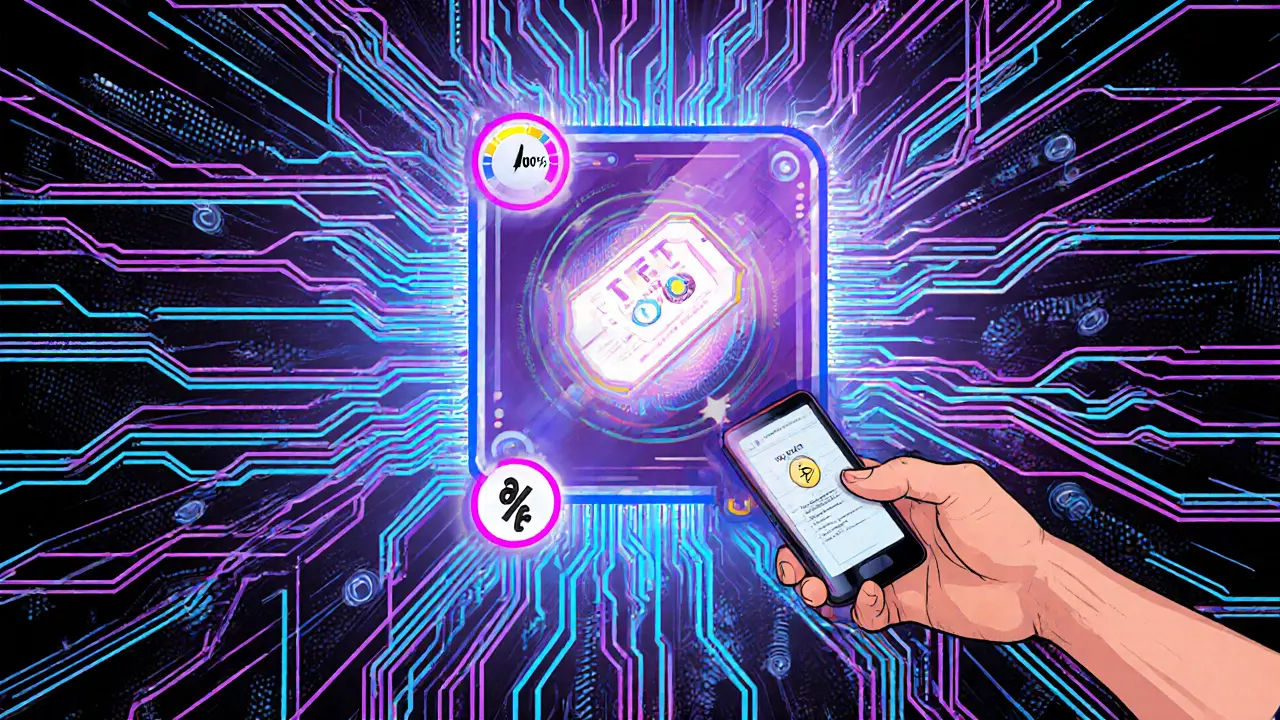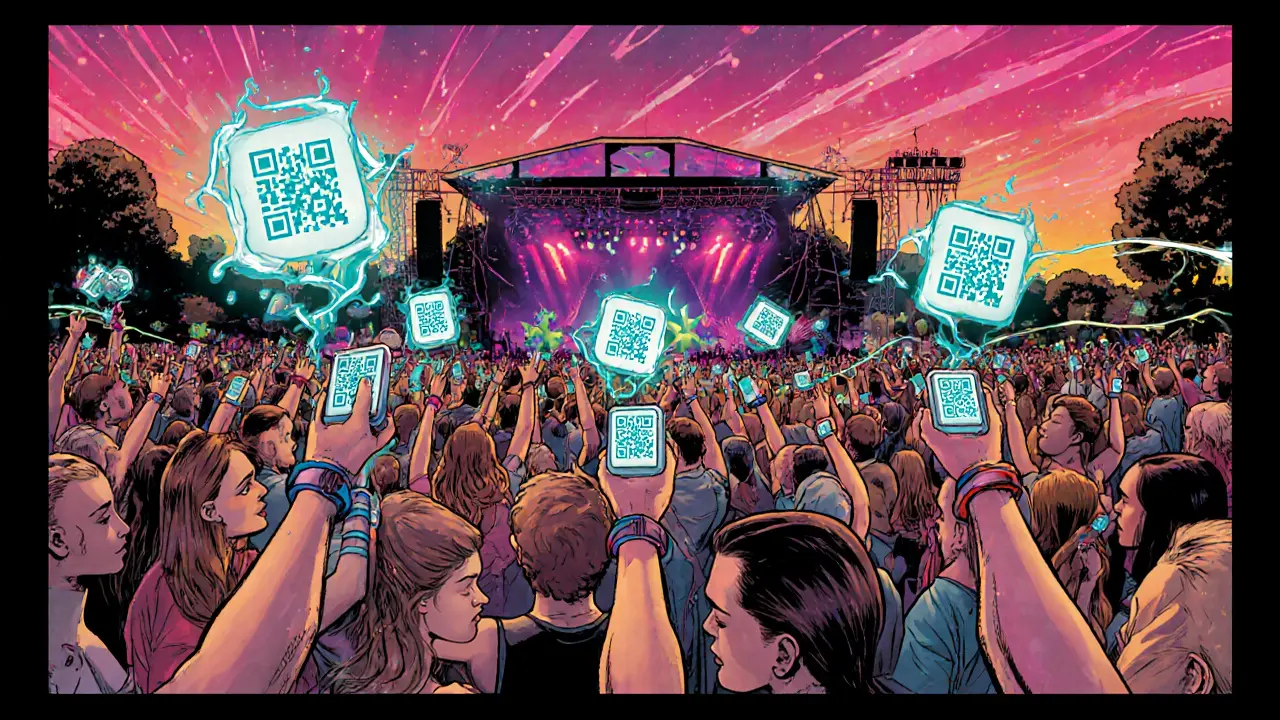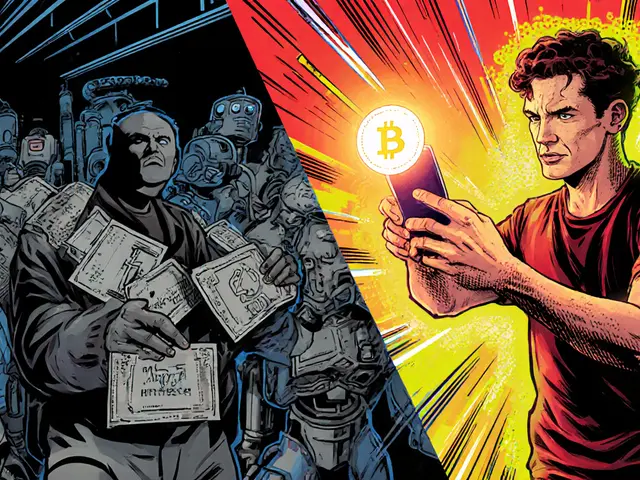NFT Ticketing Benefits Calculator
Compare Ticketing Methods
Enter details below to see how NFT ticketing could benefit your event or help you understand the value.
Enter values and click "Calculate Benefits" to see the comparison.
Key Benefits of NFT Ticketing
- Prevents price gouging through resale caps
- Guarantees fair pricing for fans
- Creates ongoing revenue through royalties
- Eliminates counterfeit tickets
- Provides transparent ownership tracking
Feature Comparison Table
| Feature | NFT Ticketing | Traditional Ticketing |
|---|---|---|
| Uniqueness | Each ticket is a distinct token on a blockchain | QR codes can be duplicated or forged |
| Resale Control | Smart contracts enforce price caps and royalty fees | Resale largely unregulated, prone to price gouging |
| Fraud Detection | Instant verification via public ledger | Manual checks, often too late |
| Revenue Stream | Organizers earn royalty on every secondary sale | No secondary-market revenue for organizers |
| Transferability | Device-locked, wallet-based transfers only | Physical or PDF tickets can be passed around freely |
Imagine buying a concert ticket at face value, only to see it flash up on a resale site for three times the price. That’s the everyday reality of NFT ticketing - a technology that’s turning the ticket market upside down. By locking ownership to a tamper‑proof digital record, event organizers can finally stop bots, bots, and price‑gouging from ruining the fan experience.
Key Takeaways
- NFT ticketing stores each ticket as a unique asset on a blockchain, making duplication impossible.
- Smart contracts enforce resale caps, royalty splits, and device‑locked transfers.
- Major festivals and platforms (Ticketmaster, Coachella, Tomorrowland) already use the system.
- Compared with paper or QR tickets, NFT tickets cut fraud, guarantee fair pricing, and generate new revenue streams.
- Adoption hurdles include wallet setup, blockchain fees, and scalability concerns.
Why Ticket Scalping Still Rules
Ticket scalping thrives on three weaknesses of traditional ticketing: anonymity, unlimited duplication, and a lack of resale control. Bots scramble to snap up every available seat the moment sales open, then dump the tickets on secondary markets at inflated prices. Even when events require a name on the ticket, scammers can forge IDs or use third‑party sellers who simply ignore the original buyer’s rights.
Enter the Blockchain
At the heart of the solution is blockchain a distributed ledger that records transactions in an immutable, public chain. Every time a ticket is minted, transferred, or resold, the action is written to this ledger, creating a permanent audit trail.
How NFT Ticketing Works
When an event launches, organizers mint a collection of NFT ticketing digital tokens that represent individual seats or entry passes. Each token carries a unique identifier, the buyer’s wallet address, and metadata like seat number and event date.
The magic happens inside a smart contract self‑executing code on the blockchain that enforces predefined rules without human intervention. Organizers can program the contract to:
- Block any transfer that isn’t initiated from the owner’s verified digital wallet.
- Set a maximum resale price - for example, no higher than 120% of the original face value.
- Automatically route a royalty fee (say 15%) back to the event promoter each time the ticket changes hands.
Because the contract lives on the blockchain, it can’t be overridden by a reseller or a scalper’s bot. The ticket simply won’t move unless it meets every rule.
Device‑Locked Tickets and Wallets
Most platforms pair NFT tickets with a digital wallet software that stores cryptographic keys and lets users sign blockchain transactions. The wallet can be tied to a phone’s biometric lock, meaning the ticket only travels with the device that holds the private key. If a scalper tries to copy the QR code, the blockchain will reject the duplicate because the key doesn’t match the recorded owner.

Real‑World Adoption
Big names are already testing the model. Ticketmaster the world’s largest ticketing platform, which now issues NFTs for select events has embedded price‑cap clauses into its contracts, dramatically reducing resale spikes for high‑demand concerts. At Coachella the annual California music festival, attendees reported almost no counterfeit tickets and a smooth resale experience powered by NFTs. Tomorrowland the Belgian electronic‑music festival, which sold premium passes as NFTs with embedded royalty splits, generated an extra 12% in revenue from secondary‑market sales.
Benefits Over Traditional Ticketing
| Feature | NFT Ticketing | Traditional Ticketing |
|---|---|---|
| Uniqueness | Each ticket is a distinct token on a blockchain | QR codes can be duplicated or forged |
| Resale Control | Smart contracts enforce price caps and royalty fees | Resale largely unregulated, prone to price gouging |
| Fraud Detection | Instant verification via public ledger | Manual checks, often too late |
| Revenue Stream | Organizers earn royalty on every secondary sale | No secondary‑market revenue for organizers |
| Transferability | Device‑locked, wallet‑based transfers only | Physical or PDF tickets can be passed around freely |
The table shows why many promoters consider NFTs a game‑changer. Not only do fans get a fairer chance at buying tickets, but organizers also tap into a continuous income source.
Challenges and Considerations
Despite the promise, NFT ticketing isn’t a silver bullet. Blockchain networks still face scalability limits - during a sold‑out pop‑star concert, a surge of transactions can push gas fees up, making cheap tickets suddenly pricey. Environmental concerns linger, especially on proof‑of‑work chains, though newer proof‑of‑stake solutions (like Polygon or Solana) are dramatically lowering energy use.
From a user perspective, managing a digital wallet requires storing private keys and sometimes paying transaction fees can feel daunting. Older fans or casual concertgoers may prefer the simplicity of a barcode on their phone. To bridge the gap, platforms are rolling out “custodial wallets” where the ticketing company holds the key for the user, but this re‑introduces a central point of failure.
Getting Started: A Checklist for Organizers
- Choose a blockchain. Look for low fees, high throughput, and a strong developer ecosystem (e.g., Polygon, Flow).
- Develop or license a smart‑contract suite. Include resale caps, royalty percentages, and device‑lock logic.
- Integrate wallet onboarding. Offer both self‑custody and custodial options to reduce friction.
- Set clear resale policies. Publish the maximum resale price and royalty rate upfront.
- Run a pilot. Test with a low‑stakes event to catch UX bugs before a major launch.
- Educate fans. Provide step‑by‑step guides, video tutorials, and live support for wallet creation.
What Fans Need to Do
First, download a reputable wallet app (MetaMask, Trust Wallet, or a platform‑specific solution). Next, secure the seed phrase - that’s the master key that restores the wallet if you lose the phone. When you purchase an NFT ticket, the token appears in the wallet’s “Collectibles” tab. At the venue, simply scan the QR code generated by the wallet; the backend checks the blockchain for ownership before letting you in.
If you want to resell, open the ticket in the wallet, choose “Transfer,” and the smart contract will automatically cap the price and deduct the royalty before sending the token to the buyer’s address.
Future Outlook
Analysts predict that by 2028, over 30% of high‑profile events will use NFT ticketing as the default. As blockchains become more energy‑efficient and user interfaces grow as intuitive as a typical e‑commerce checkout, the remaining barriers will shrink. Expect to see more hybrid models where a single QR code contains both a traditional barcode and an embedded NFT reference, giving fans the best of both worlds.

Frequently Asked Questions
Can I still get a refund on an NFT ticket?
Yes. Organizers can code a refund function into the smart contract. When a refund is issued, the token is burned (removed from the ledger) and the buyer’s wallet receives the original payment back, minus any processing fees.
What happens if I lose my phone?
Your ticket lives in the wallet, not on the device. As long as you have the seed phrase, you can restore the wallet on a new phone and regain access to the NFT ticket.
Do NFT tickets cost more because of blockchain fees?
Transaction (gas) fees are a small addition, typically a few pennies on major networks. Some platforms absorb the fee or bundle it into the ticket price to keep the experience seamless.
Are NFT tickets environmentally friendly?
Proof‑of‑stake blockchains (e.g., Polygon, Solana) use less than 0.01% of the energy that proof‑of‑work chains consume. Most ticketing providers have already migrated to these greener networks.
How do royalties work for event organizers?
When a ticket is resold, the smart contract automatically splits a pre‑defined percentage (e.g., 15%) to the organizer’s wallet and the remainder to the seller. This occurs without any manual processing.


Brooklyn O'Neill
June 6, 2025 AT 06:00Great overview! I especially like how NFT tickets can keep prices fair for everyday fans while still giving promoters a new revenue stream. It feels like a win‑win for the whole community.
Patrick MANCLIÈRE
June 8, 2025 AT 13:33The cultural shift that comes with blockchain‑based tickets is massive. By encoding resale caps directly into the smart contract, we finally give artists some control over their own shows. Plus, fans don’t have to battle bots on a crazy‑early sale page anymore.
Ciaran Byrne
June 10, 2025 AT 21:06Concise: NFTs lock resale prices and cut down counterfeit tickets.
Carthach Ó Maonaigh
June 13, 2025 AT 04:40Sure, it sounds shiny, but let’s be real – the gas fees will eat most of the ticket price for smaller gigs. And if a scalper figures out a loophole, the blockchain won’t magically stop them.
Marie-Pier Horth
June 15, 2025 AT 12:13Ah, the world of NFT ticketing – a dazzling tapestry woven from the finest strands of technology and optimism. One cannot help but marvel at the audacity of a system that promises to exterminate the age‑old scourge of scalpers, those mercenaries of the secondary market, with a single line of code. Imagine a future where the humble fan, unburdened by surging resale prices, can simply purchase a seat at face value and attend the concert of their dreams. The blockchain, that immutable ledger, becomes the guardian of authenticity, stamping each ticket with an unforgeable signature. No more counterfeit paper, no more PDF copies that can be duplicated ad infinitum – just a digital token that lives forever on a distributed network. Moreover, the smart contract, like a diligent steward, enforces resale caps, ensuring that no one can flip a ticket for three, four, or even ten times its original cost. The royalty mechanism is a masterstroke, feeding a continuous stream of revenue back to the artists and promoters each time a ticket changes hands. This is not merely a revenue boost; it is a re‑balancing of power, returning a slice of the pie to those who create the experience. Critics may point to the dreaded “gas fees,” but the landscape is shifting; proof‑of‑stake chains now operate on fractions of a cent, rendering those concerns nearly obsolete. Environmental worries, too, are being laid to rest as the community migrates from energy‑guzzling proof‑of‑work to greener alternatives. Yet, we must not ignore the human element – a wallet, seed phrases, and a dash of digital literacy are required, which may alienate the less tech‑savvy. Solutions are emerging, however, in the form of custodial wallets that hide the complexity behind a familiar login screen, though they re‑introduce a central point of failure. The journey ahead is riddled with challenges, but the destination promises a concert‑going experience free from the tyranny of scalpers, where fairness reigns and creators are duly compensated. In sum, NFT ticketing is not a panacea, but it is undeniably a monumental step toward democratizing access to live events.
Gregg Woodhouse
June 17, 2025 AT 19:46i guess it could work but idk if people will actually learn wallets lol.
F Yong
June 20, 2025 AT 03:20Oh sure, because the government isn’t already watching every transaction you make. It’s all about the ‘balance’ – but maybe it’s just another way to keep an eye on us.
Sara Jane Breault
June 22, 2025 AT 10:53Just take it step by step. First, get a wallet, then your seed phrase, and finally the ticket. If anything goes wrong, support teams are usually quick to help.
Enya Van der most
June 24, 2025 AT 18:26Let’s get pumped! NFT tickets mean we can actually enjoy the show without watching the headline price explode. Grab yours, lock it, and bring the energy!
Eugene Myazin
June 27, 2025 AT 02:00Really exciting stuff! If we keep the process simple, more people will jump on board and the whole scene will be better for everyone.
karsten wall
June 29, 2025 AT 09:33From a systems‑engineering perspective, tokenizing entry passes reduces state‑space complexity and mitigates duplicate‑entry vectors. The smart‑contract layer abstracts policy enforcement, which is a boon for scalability.
C Brown
July 1, 2025 AT 17:06Wow, look at that! Another tech fad trying to fix a problem that people created by being greedy. Bet the organizers will just charge extra for the “premium” NFT experience.
Noel Lees
July 4, 2025 AT 00:40Nice breakdown! 😊 I’m curious how the royalty percentages will affect ticket prices overall.
Raphael Tomasetti
July 6, 2025 AT 08:13Royalties are typically a small markup; they’re absorbed by the marginal cost and don’t drastically raise the base price.
Jenny Simpson
July 8, 2025 AT 15:46But isn’t that just another hidden fee? The fans will still feel the pinch, even if it’s “transparent.”
Sabrina Qureshi
July 10, 2025 AT 23:20Wow!!! This is such a fascinating development!!! I can’t wait to see how it impacts the whole industry!!! The idea of embedding royalty fees into each resale feels like a game‑changer!!! However, I wonder about the user‑experience for the average concert‑goer, especially those who aren’t tech‑savvy!!! The reliance on wallets and seed phrases might be a barrier!!! Maybe we’ll see more custodial solutions that hide the complexity!!! Either way, the potential for fairness and reduced fraud is huge!!! Let’s keep an eye on the upcoming pilots!!!
Rahul Dixit
July 13, 2025 AT 06:53Sure, but all these “solutions” just pave the way for more centralized control. The data will be used for who‑knows‑what.
CJ Williams
July 15, 2025 AT 14:26Embrace the future! 🌟 NFT tickets can bring us together, make events safer, and even add a bit of fun with digital collectibles. Let’s stay positive and support the transition! 😊
mukund gakhreja
July 17, 2025 AT 22:00While it sounds good on paper, the reality is that many fans won’t bother learning wallets, so adoption will be slow.
Ron Hunsberger
July 20, 2025 AT 05:33For organizers, the added royalty stream could fund better production values and lower ticket prices overall.
Kamva Ndamase
July 22, 2025 AT 13:06Exactly! More revenue for the artists means they can invest in bigger stages and surprise guest performers.
Janelle Hansford
July 24, 2025 AT 20:40It’ll also encourage festivals to keep ticket prices reasonable, knowing they’ll get a cut from second‑hand sales.
Marie Salcedo
July 27, 2025 AT 04:13That’s a solid point – the system rewards fairness for everyone involved.
Mangal Chauhan
July 29, 2025 AT 11:46In formal terms, the implementation of non‑fungible tokens as admission credentials constitutes a paradigm shift in event logistics, warranting rigorous analysis of regulatory compliance and consumer protection statutes.
Darius Needham
July 31, 2025 AT 19:20Agreed. We should monitor how different jurisdictions adapt their laws to accommodate this new model.